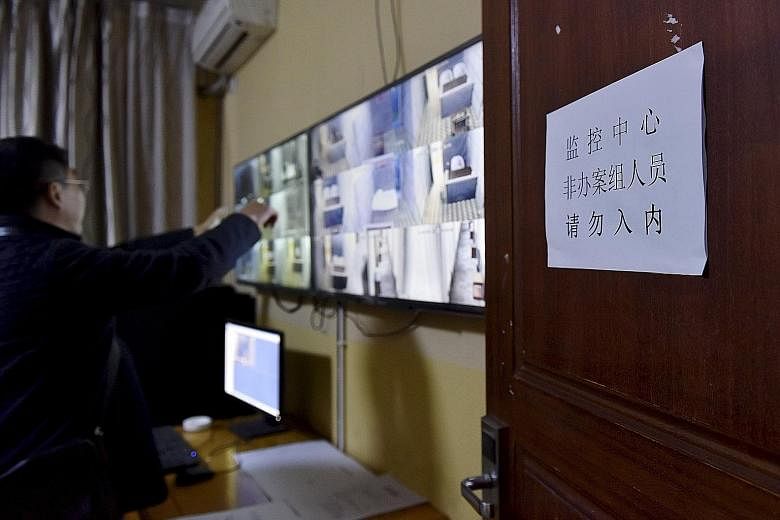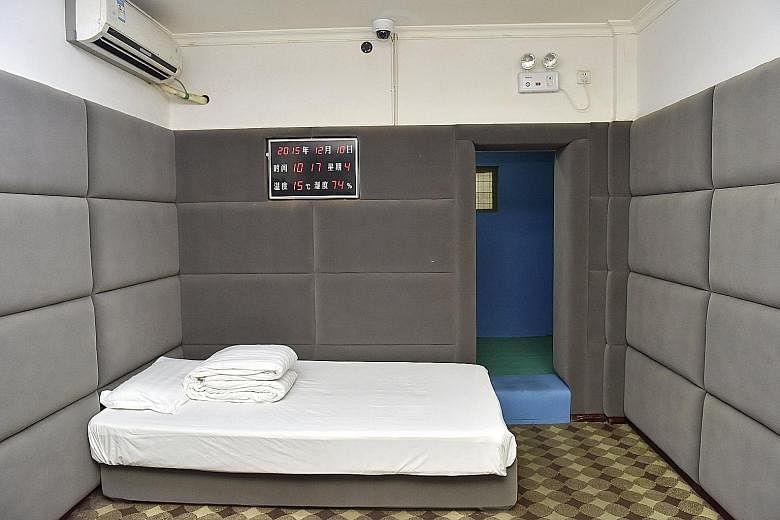BEIJING • Chinese officials convicted in President Xi Jinping's anti-corruption drive have embezzled or misused nearly US$1 billion (S$1.43 billion) in public funds, a new report has found.
Official graft causes widespread public anger in China, and since taking over as the ruling Communist Party's leader in 2012, Mr Xi has overseen a much-publicised campaign against the scourge.
But critics say there is a lack of transparency around the drive and that it has been used to settle political scores.
ChinaFile, a publication of the Asia Society in New York, has tallied nearly 1,500 publicly announced targets of the campaign, and has released a searchable database.
It shows that 231 officials have been convicted and sentenced in Chinese courts - only a fraction of those put under investigation by the Communist Party, which operates its own disciplinary system outside judicial supervision.
Chinese courts - which are controlled by the party and have a conviction rate of more than 99.9 per cent - found that they embezzled or misused more than 6.3 billion yuan (S$1.4 billion), according to the verdicts against them, the database shows.
-
BIG NAMES BUSTED
-

ZHOU YONGKANGInvestigated: July 29, 2014
Arrested: Dec 6, 2014
Sentenced: June 11, 2015
Last position held: Member of the Politburo Standing Committee
Amount involved: 130 million yuan (S$28 million)
-

BO XILAIInvestigated: April 10, 2012
Arrested: April 10, 2012
Sentenced: Sept 22, 2013
Last position held: Party Secretary of Chongqing
Amount involved: 19 million yuan
-
LIU ZHIJUN
Investigated: Feb 1, 2011
Expelled: May 24, 2012
Sentenced: July 8, 2013
Last position held: Minister of Railways
Amount involved: 64 million yuan
The documents included details such as one official spending 200,000 yuan of public funds on jade jewellery, and another attempting to hide a stolen 30 million yuan in his mistress' gardening company.
Mr Xi pledged to target both high-ranking "tigers" and low-level "flies" in his drive.
The governor of populous Sichuan province became the latest to fall, provincial authorities said yesterday, after he resigned over allegations that he had committed "severe disciplinary violations" - a euphemism for corruption.
Mr Wei Hong was reportedly a close friend of China's hugely influential former security chief Zhou Yongkang, by far the most senior figure brought down in the anti-graft campaign and for whom Sichuan was a power base.
The fall of a Chinese official is not easy to represent graphically. There are circles of hell they pass through.
First comes the announcement by the Communist Party's Central Commission for Discipline Inspection that an official is under investigation, often accompanied by an announcement of the official's dismissal. Many officials are then expelled from the party and referred to the criminal justice system for prosecution. Last comes the trial and the nearly inevitable guilty verdict.
The ChinaFile "Catching Tigers and Flies" database aims to document each phase, as well as the links between those caught up in the campaign.
ChinaFile's visual tool can be sorted geographically by province, chronologically, by sector (military, politics, law, petroleum and mining, for example), and even between tigers and flies.
The database includes proportionately fewer fallen officials from President Xi's provincial power bases of Fujian and Zhejiang, which ChinaFile said "are among those that appear to have been treated more leniently".
In Fujian - a province racked by a widespread smuggling scandal in the 1990s while Mr Xi was rising in the ranks, on his way to the governorship by the end of the decade - only two senior officials have been toppled, and both only last year.
In contrast, in neighbouring Jiangxi province, with a similar population, five senior officials have been toppled, the first in 2013.
Immediately to the north of Fujian is wealthy Zhejiang province. Mr Xi, who became the country's President in March 2013, was the top official there from 2002 to 2007. Not counting two major generals assigned to the province, only two top officials there have fallen, both for adultery and the first only at the end of 2014, two years into the anti-corruption campaign, according to the ChinaFile database.
Nationwide, ChinaFile tracked 146 senior officials and 1,316 lower-ranking officials who have been under investigation, expelled from the party, or tried and convicted.
Mr David Zweig, professor of Chinese politics at the Hong Kong University of Science and Technology, said yesterday: "If you're a Xi guy, you don't get purged. Everybody else, it's open season.
"When he was in those places, he was able to move people into positions of authority, people who are allied to him. Therefore, there's no need to use the crackdown to transfer out people."
AGENCE FRANCE-PRESSE, NEW YORK TIMES


